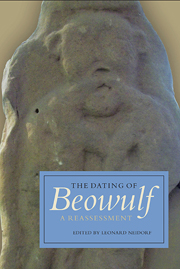Book contents
- Frontmatter
- Contents
- List of Tables
- List of Illustrations
- List of Contributors
- Acknowledgements
- Introduction
- 1 Beowulf and Language History
- 2 Germanic Legend, Scribal Errors, and Cultural Change
- 3 Names in Beowulf and Anglo-Saxon England
- 4 The Limits of Conservative Composition in Old English Poetry
- 5 The Date of Composition of Beowulf and the Evidence of Metrical Evolution
- 6 Beowulf and the Containment of Scyld in the West Saxon Royal Genealogy
- 7 History and Fiction in the Frisian Raid
- 8 ‘Give the People What They Want’: Historiography and Rhetorical History of the Dating of Beowulf Controversy
- 9 A Note on the Other Heorot
- 10 Beowulf and Conversion History
- 11 Material Monsters and Semantic Shifts
- 12 Scandals in Toronto: Kaluza's Law and Transliteration Errors
- 13 Afterword: Beowulf and Everything Else
- Index
8 - ‘Give the People What They Want’: Historiography and Rhetorical History of the Dating of Beowulf Controversy
Published online by Cambridge University Press: 05 October 2014
- Frontmatter
- Contents
- List of Tables
- List of Illustrations
- List of Contributors
- Acknowledgements
- Introduction
- 1 Beowulf and Language History
- 2 Germanic Legend, Scribal Errors, and Cultural Change
- 3 Names in Beowulf and Anglo-Saxon England
- 4 The Limits of Conservative Composition in Old English Poetry
- 5 The Date of Composition of Beowulf and the Evidence of Metrical Evolution
- 6 Beowulf and the Containment of Scyld in the West Saxon Royal Genealogy
- 7 History and Fiction in the Frisian Raid
- 8 ‘Give the People What They Want’: Historiography and Rhetorical History of the Dating of Beowulf Controversy
- 9 A Note on the Other Heorot
- 10 Beowulf and Conversion History
- 11 Material Monsters and Semantic Shifts
- 12 Scandals in Toronto: Kaluza's Law and Transliteration Errors
- 13 Afterword: Beowulf and Everything Else
- Index
Summary
In 1958, the movie mogul Harry Cohn died. Seeing the huge crowds that turned out for the funeral, one actor expressed his bewilderment: “But everyone in Hollywood hated Harry!” he exclaimed. “Why are all these people here?” In 1981, after a conference in Toronto and the publication of a proceedings volume, a no-less-surprising throng began to gather, in books, journals and conferences, for the scholarly funeral of a dateable Beowulf. We have no record of anyone exclaiming in surprise: “But the evidence for an early date of Beowulf is relatively consistent, convincing and well-established! Why would people be happy to replace it with speculation and uncertainty?” But the words of the comedian Red Skelton, who had worked for Cohn, explain both seeming paradoxes: “Give the people what they want and they'll turn out for it.”
Even when I was a graduate student at my first significant Anglo-Saxon conference, ISAS 1995 at Stanford, I heard the rumors about that Toronto conference. Sometimes they were sotto voce, sometimes louder (especially when there was an open bar), but always they said a version of the same thing: the famous Dating of Beowulf conference at Toronto and the subsequent proceedings volume were not entirely on the level.
- Type
- Chapter
- Information
- The Dating of BeowulfA Reassessment, pp. 157 - 177Publisher: Boydell & BrewerPrint publication year: 2014

